Evgeny Morozov’s The Syllabus collects the best articles, podcasts and videos about the political, economic and social consequences of the coronavirus pandemic on a daily basis. In these uncertain times, as misinformation spreads online, it is essential reading. I was with him when he first shared The Syllabus with the world.

Spring, 2018. Evgeny Morozov is standing on a rubber mat in a hotel room in Cambridge, Massachusetts. The world’s foremost technology critic is scared. He’s afraid of dying knowing that there are books he doesn’t know about.
Hundreds, maybe thousands, of books are strewn around the room. On the floor, on the chair, on the bed, under the bed, next to the bed. There’s an open book on a desk in front of him. He uses an iPad to snap pictures of its pages, flipping them at great speed with two fingers. On a good day, he scans 100 pages per minute, 12 books in an hour, 100 in one day.
Morozov scans books he believes he should read someday. He knows which ones to read because he has devised a system that can determine the relevance of every book in the world. And his system isn’t just for books. It’s for all information and knowledge.
It was on that rubber mat in Massachusetts that The Syllabus was born. Essentially, it’s a site that recommends the very best and most relevant books, podcasts, scientific articles, videos and journalism to anyone who wants a better understanding of the world.
But there’s more to The Syllabus. Morozov wants to make people think. The Syllabus criticises how information and knowledge are discovered and disseminated online, based as they currently are on clicks, likes and shares. In other words, based on popularity. Morozov is building a system that determines the relevance of information in a new way – a way that might even be better than Google.
You read that right: Morozov, the most prominent critic of Silicon Valley, has started an online service with a mission as megalomaniacal as many tech companies.
I was there last September as he prepared to share The Syllabus with the world from southern Italy.

We’ve been on the road for half an hour when Antonio, my driver, points to a cluster of white houses in the distance. That’s our destination: the family home of Morozov’s wife in Rose, a village with 4,000 inhabitants, built on a steep hill near the coast of Calabria on the instep of the Italian boot.
"How do you know him?" Antonio asks as he steers his car into the Calabrian hills.

How did I get to know Morozov? As a journalist trying to get to grips with the influence of technology on society and our lives, the Belarusian writer has been indispensable to me for more than 10 years.
I first heard of him in 2008, when he was blogging for several US websites. He was in his twenties then, writing articles that made him notorious: he ripped into entrepreneurs, trend watchers and others who preached about a digital utopia. He tore their utopian visions to shreds – and visibly loved doing it. “This is a book that should’ve stayed a tweet,” he wrote about tech guru Jeff Jarvis’s latest book.
I also know him from the very first time I interviewed him in 2013, which didn’t end well.
I asked: "In your latest book, you strongly criticise journalists who write about technology. They don’t understand what technology is and are not at all critical. What can journalists learn from your ideas?"
His reply? "Why are you asking me? You’re the journalist, aren’t you?"
And I know two phenomenal books he wrote: The Net Delusion (2012) and To Save Everything, Click Here (2013), which slammed Silicon Valley Big Tech, years before it was fashionable to do so.
Morozov disputes the popular idea that “the internet” and “digital” are unique phenomena, that these technologies are drivers of a revolutionary era, and that the iPhone, Google, and Uber are unprecedented inventions – innovations, even! – made possible by the exceptional genius of Silicon Valley’s tech nerds.
Politicians and journalists believed the internet would democratise the world, so they could never have imagined that five large corporations would end up with so much power
Quite the opposite, in fact. Morozov consistently shows that digital technology is an extension of existing systems, not independent of history and political-economic reality. Silicon Valley, for example, was created because the US government invested in technologies to win the Cold War. Google’s search engine algorithms were funded by US ministries. During the 2008 financial crisis, cities in the western world eased the rules for renting out houses, allowing residents to earn a little on the side and enabling Airbnb to grow rapidly.
Morozov shows how the myth of the “exceptional” Silicon Valley blinded us to reality. Politicians and journalists believed the internet would democratise the world, so they could never have imagined that five large corporations would end up with so much power. Google and Facebook were seen as idealistic movements, not as listed companies that needed to present better numbers to their shareholders every quarter. The United States preached the internet freedom gospel for years, while simultaneously setting up a highly advanced online surveillance infrastructure at the National Security Agency.
The myth was powerful and influential. Google, Facebook and Amazon were given special legal and tax exemption status because for a long time, politicians believed these were exceptional companies. And cities unthinkingly rolled out the red carpet for Uber and Airbnb.
Now, in 2020, criticising Big Tech is a popular pastime, but I sometimes wonder: what if we had listened to Evgeny Morozov a little earlier?

This is what I would like to tell driver Antonio, but he doesn’t speak English, and my Italian is too shabby.
As Antonio parks the car outside the Calabrian villa’s green gates, Morozov is already strolling towards us in shorts, a loose-fitting T-shirt and sandals. He opens the gate, shakes my hand and starts speaking to Antonio in fluent Italian. He gives instructions to pick me up in four days. Together we walk to the big house, where Morozov and four companions have been working on the launch of The Syllabus.
In three days, the project he’s been investing all of his thinking power into for the last six years will go live. If everything goes according to plan.
Morozov gives me a brief tour, offers me a plum from one of the trees, picks grapes from a bunch and points the olive grove and goats out to me. Inside the villa, there’s no high-tech data centre, no trainees frantically running around. Just a few computers and his team of four. I am the only journalist, the only intruder.
It’s Friday. The launch is scheduled for Monday, I will be leaving on Tuesday morning, and there is still a lot to be done.

Clearly, I am not the only admirer of the Belarusian thinker in this house.
"Apparently, I’m the CTO," says Nikolai Maximchuk, 22, when I ask him about his role. He’s Morozov’s nephew. Maximchuk is not a techie – he studied liberal arts in Berlin – but he “has a decent grasp of the whole thing”. He is almost continuously seated at his screen. Just like the others.
Every day I’m there will be more or less the same. Eat, sleep, code, repeat. Everyone has a workplace in the spacious living room. Only Morozov has an office to himself, on the first floor.
Each day has two highlights – 1.30pm in the afternoon and 8pm in the evening – when the local restaurant owner enters the house with steaming, delicious, greasy pasta dishes, and we sit down at the table. Twice a day, people talk and laugh for 45 minutes, then go back to work.
There are hardly any breaks. It is still unclear whether Morozov’s system will be fully operational in time.
The idea is that by Monday, a website will go online, where visitors can subscribe to nine different newsletters that link to the most relevant information on the 60 most important themes of our time, and where they can compile their own personalised newsletter.
Every day I’m there will be more or less the same. Eat, sleep, code, repeat
Maximchuk tells me he is learning a lot here – both from working with technologies and databases but especially from his role model, Morozov. "Just being around him is an education."
There’s also Giovanni Scala, a quiet 23-year-old Italian, who does all sorts of odd jobs for the team.
Ekaitz Cancela (26), a young Spanish author, is Morozov’s right hand. "My job is to translate Evgeny’s thinking into something machines can understand." Cancela is an interesting character – obviously very intelligent, but not always easy to understand when he speaks English. "He knows everything, he has everything in his head," he says of Morozov. "All the research he does, he really reads it all. Unbelievable."
"However," he says, "it’s not so much the amount he reads, it’s what he reads. He reads well and in a focused manner. I learned from him: don’t read bullshit." Cancela is an outspoken idealist; a conversation with him soon turns into an obsessive reflection on capitalism. "Imagine Karl Marx having the same system as Evgeny!" He thinks The Syllabus can make the world a better place. "It shows how the internet could also work. And we are building it! "
Morozov’s partner in The Syllabus is Edward “Eddy” Tomordy (36). A few months ago, Tomordy, a Scottish-Austrian, quit his job as partner in a New York hedge fund that managed hundreds of millions of dollars. "After having ruined the world, I now want to make something beautiful," says Tomordy, half ironically, half sincerely. He and Morozov finance The Syllabus together.
Morozov and Tomordy studied together in Berlin and have been friends for over 15 years. "I know a lot of very smart people, but Evgeny really is on a different level," Tomordy tells me. "When we were 20, it was already clear that he had a different kind of mind, which continues to surprise me. He thinks in a completely different way, superhuman. The great thing is that The Syllabus will make a part of Evgeny available to a larger audience."

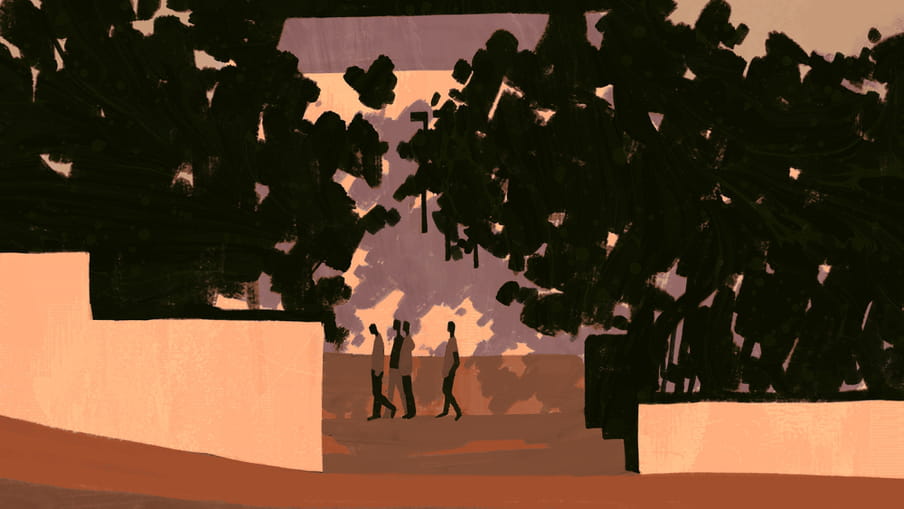
Current sources of information aren’t good enough
Morozov is chopping courgettes and carrots for a vegetable soup. It’s midday on Saturday afternoon, and we’re sitting together at the kitchen table. He chops and chats, and I listen. He tosses diced vegetables into a Morphy Richards Total Control Soup Maker.
"I have until one o’clock," he says. "That’s when my Chinese lessons start."
"Chinese lessons?"
"Yes, one hour, three days a week. Come and take a look later on. "
And he tells me about the system he developed to determine the relevance of books.
It started in 2013, when Morozov started working on his new book while completing a PhD at Harvard. His book To Save Everything, Click Here had just appeared and made him world famous at the age of 28.
However, he wasn’t caught up in the hype. "Superficial," the “prodigy” called his own work. "I have more influence than I ought to," he told a New York Times interviewer.
His aim was to write an intellectual history of the internet, but he found his own books too simplistic, too mainstream, and he started reading about other topics. About information theory, cybernetics, counterculture, LSD, architecture, design, psychoanalysis, neoliberalism, and more. His next book would be a book on everything. (It’s not finished yet. Morozov expects it will be three volumes.)
At the same time, he learned new languages. Spanish, Italian, Portuguese. A little Polish, some Dutch, some Norwegian, Swedish and Romanian. He knew he needed to read even more books.
But if you can choose from so many books, you need to be extremely selective. How do you determine what to read? Or more importantly: how do you determine what not to read?
So Morozov thought about a method to work out the relevance of books. "I had to think of a way of reviewing all 10 million books in Harvard Library without reading them. I had to organise them, rank them based on my interests."
He had a flash of inspiration: what if he started at the end? With the hypothetical index of the book he hadn’t written yet? After all, that would contain all of the important concepts, people and institutions. Maybe he could compare that with the contents of all the books that had ever been released and find a way to calculate how closely they match. That way, he would know which books would be relevant, and which books he should read.
The man who once called himself a “digital heretic” began to experiment with online search methods and scraping tools. He built apps, programmed code, and wrote scripts. With the help of his nephew Maximchuk and Belarusian developers, he built a first, rudimentary system. A system that worked.

"Shit. I’ve put too many vegetables in this." Morozov removes some courgette pieces and presses the soup maker’s on button.
He currently lives in Barcelona, he says, where his wife Francesca Bria has been appointed as the city’s Chief Technology Officer. So he can no longer be close to the Harvard Library and all those vital books.
So he started planning trips to Cambridge, Massachusetts to scan all those volumes in hotel rooms. Over the course of a few years, he made 12 of these trips and digitised more than 10,000 books.
He would bring books from Harvard back to Barcelona and scan them there, and then have 90kg of books flown back to the US
Morozov says: “Two weeks before each trip, [I’d] start focusing on finding the books I needed to scan. So I’d deploy my method of finding books by relevance … By the time I arrived, Harvard Library would already have a few hundred books ready for me … and I’d come to the library with a lot of carry-on and Ikea bags, load them up, and would take them to my hotel … I timed my trips in such a way that I’d go to the library every evening to fetch more books and deposit the books I’ve already scanned. So everything was very efficient and I wasn’t wasting much time.”
He occasionally got carried away. He would bring books from Harvard back to Barcelona and scan them there, and then have 90kg of books flown back to the US.
But why?!
"I’ve read enough about psychoanalysis to know that I must have a deeper motivation," he says. "But I don’t need to know what it is." He apologises and sprints upstairs. Time for Chinese lessons.

After the lesson, Morozov tells me he’s getting better at reading sentences.
We’re standing at his standing desk in his office. Morozov is still wearing his headphones from the online class. His iPad is within reach. Every five minutes he checks the chat programme Slack to see what his team is up to downstairs.
"This week, I read a story in Chinese about a family that had an intelligent dog at home," he says. "When they said ‘drink water’, the dog would do it. I can handle the language well enough at that level. I can’t manage articles about geopolitics yet."
Right now, he says, he needs the distraction the lessons offer: "I need to do this." He has temporarily stopped his other classes during the week of the launch. German ("I speak it well"), Portuguese ("I speak it reasonably well"), French ("also good, not yet fluent"), Italian ("fluent, I only take lessons when I need to appear on TV"), and Spanish ("fluent").
If he had time left over, he says, he would build an app with the help of a few techies that would make learning languages much faster. "I have learned so many languages with so many different apps and tools that I have devised my own method – a better method, I dare say – to optimise language learning."

"Optimisation." It’s been on my mind since I got here. I associate it with Silicon Valley, Google algorithms, self-help books. Tailored information. US fanatical efficiency.
I wouldn’t have associated it with Morozov, the man whose books rage against technological solutions to complex problems and the pursuit of perfection, the man who argues in favour of non-optimised politics, mistakes, embracing chance. But Morozov turns out to be an optimised information-processing machine.
"I have a good life," he says when I put this to him. "I spent a few weeks at the beach in Italy this summer, where we had dinners with 25 people." He’s implying that not every minute has to be utilised efficiently. "But when I’m working, I want to spend my time in a way that maximises everything I do."
So he ordered a special rubber work mat on which he can stand painlessly for 12 hours. He bought two soup gadgets to make soup quickly. A cook from the village brings steaming pasta dishes for lunch at exactly 1.30pm every day.
"Many things in my life come down to not losing too much time."
That also applies to The Syllabus, he says. "Everything started with the realisation that I had to organise my reading time much more efficiently. I can’t read everything that happens to find its way to my inbox or Twitter feed. I needed an efficient and self-sufficient system. And I knew that no one else would create it for me. "
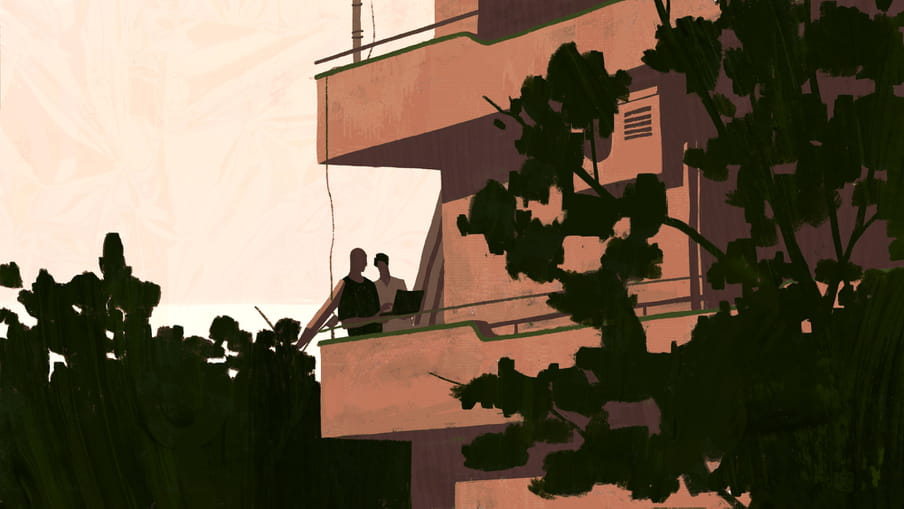
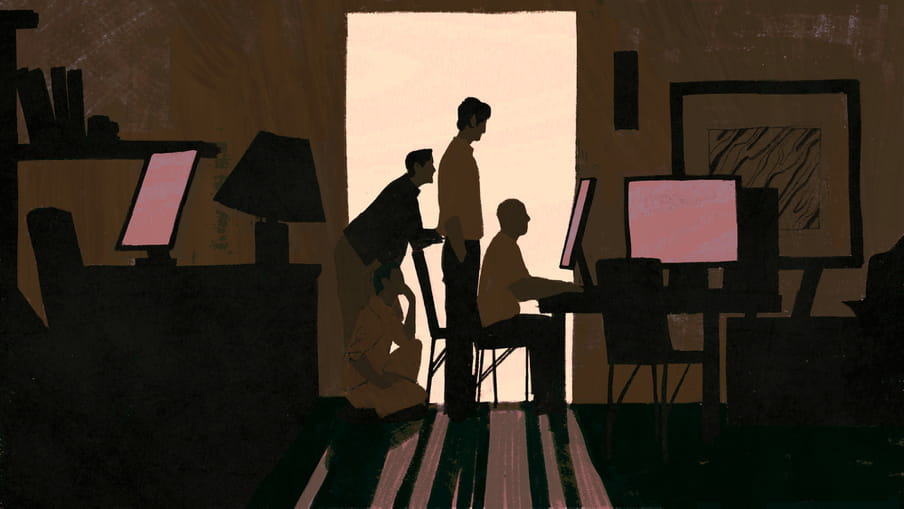
What Morozov wants to achieve
By now, Morozov is sitting on a large orange-red beanbag in his office. There is a pregnancy pillow on the beanbag because it allows him to sit longer without discomfort. We have about half an hour, he says, maybe 40 minutes. Then the next to-do will demand his attention.
I ask: you’re not just building The Syllabus for yourself – what do you want to achieve with it? What is the great critic’s project criticising?
He emphasises that he’s not after a major revolution: "We are not trying to build a planned economy as an alternative to the market economy here." Instead, broadly speaking, he has two goals.
There is something fundamentally problematic about the way information is discovered and disseminated, Morozov explains. The largest information companies depend completely on advertisements: Google, Facebook, Instagram, Twitter. The result? A certain type of information is rewarded online. Information that can sell adverts, that generates clicks, that’s easy to package, that can be standardised.
That means important, relevant information disappears into the background. It is not easy to package, is not retweeted much, and doesn’t get any "thumbs up".
"Such information doesn’t meet the dominant criteria for success," he says. Morozov wants to demonstrate that things can be done differently. At The Syllabus, relevance is not determined by popularity, and "clicks" don’t play a role.
A certain type of information is rewarded online. Information that can sell adverts
Soon, says Morozov, he will be working with guest editors, "very interesting eclectic intellectuals, artists and journalists". They will use Morozov’s system to discover information and share it with users of The Syllabus. The first guest editor is Brian Eno, world-famous musician and producer.
"I also see this as hijacking the way the attention economy works. Instead of all those celebrities posting things on Instagram, we hope that intellectuals can turn the attention of their followers towards more serious content."
Morozov also sees The Syllabus as a kind of "guerrilla campaign". "The fact that the information based on the greatest amount of research, which is of the highest quality, remains completely inaccessible is absurd. Large scientific publishers are not at all interested in disclosing this research, even though it has been paid for with tax money! Imagine people seeing what research has been carried out using their taxes. They might demand that this knowledge be made public for free. Changing the way scientific publishers work would be a nice side effect."

As he talks to me, he deals with a few pressing issues on his iPad.
I would like him to explain exactly how his system works, but he doesn’t want to divulge the The Syllabus’s secret recipe to me in detail.
Broadly speaking, it operates as follows.
The Syllabus automatically scores and categorises information from sources that matter to Morozov (scientific publishers, universities, etc). It does this for 60 themes. From "Energy & Extractivism" to "Post-fascism & Far-right Populism" and from "Geopolitics of Tech & Cybersecurity" to "Finance" and "Migration & Demography". You might say the most important themes of our time. Morozov explains that these are also the themes that are essential to the book he wants to write. "These are my research interests, supplemented with five to 10 themes that I find vital to understanding the world."
All incoming books, articles, videos and podcasts receive a score on each of those 60 themes. As Morozov puts it: "Suppose a scientific article about architecture, the history of drugs, neoliberalism and climate change is published. The system would award this article high scores on those four topics, and low scores on the 56 other topics."
"Taxonomies" introduced by Morozov and his team are crucial to this. These are the most important words, concepts, names and institutions related to the 60 themes. The taxonomy of, for example, neoliberalism naturally includes Hayek and Friedman, Davos and the World Bank, Thatcher and Reagan. If there is an overlap between the content of a piece of information and the taxonomies, it will be awarded a high score on that particular theme.
These taxonomies – some of which consist of 1,000 concepts – are determined automatically as well as manually. For example: the team chooses 40 important books and articles about climate change. Using special software, the content of these publications is analysed, resulting in a list of the most common content terms. The taxonomies are then refined by hand. Morozov or one of the team members conduct online research into the generated words and names, determining whether they are truly important and fit into the list.
"You might regard those taxonomies as our sensors," says Morozov, “indicating how closely new content matches our themes."
The way in which Morozov collects and analyses information is secret, he says. He doesn’t want to expand on how he compares his taxonomies with the actual content of videos, podcasts, books and articles. "That’s where our cutting-edge innovation lies."
And this is just the first phase. The categorisation and scoring of all information is an initial screening. Everything is then assessed by Morozov and his assistants, several times, ultimately resulting in a selection of the very best and most relevant information that appears during a week, sorted by theme.
That’s intensive work. During my stay, Cancela listens to podcasts for hours each day, while Morozov spends hours reviewing scientific papers. At the same time, another system monitors the information sources. Morozov’s team trusts certain podcast makers, Twitter users or video channels because they are proven providers of quality information. Morozov also uses all kinds of "tricks, algorithms and techniques" to find new information and to constantly refresh his list of sources.
The Syllabus combines these two methods – comparing content with taxonomies and monitoring providers. If the system comes up with a fascinating article that matches "neoliberalism", the author and the publishing company are also included in the list of interesting sources. Or if dozens of people share that article on Twitter, the system detects this and automatically examines what other content the Twitter users have shared.
"It’s a living system," Morozov says. "It is never finished." There is a constant feedback loop, which means that the taxonomies, information sources and the important content are constantly changing. "That’s how my brain works."
In the meantime, I wonder if The Syllabus isn’t too much like Morozov himself, too close a copy of this superman’s bizarre brain. Someone us mere mortals can’t keep up with. Isn’t he expecting too much from us? Can we use this? Isn’t The Syllabus too much, too eclectic, too profound?
"I don’t know how it will be used and by whom. We’ll see."
Our 40 minutes are up. He needs to get on.

Over the following days, stress levels in the house go up. The team works harder and discusses things more. Irritation flares up here and there. There’s some sighing and groaning.
On Monday morning, launch day, I wake up to a rhythmic rattling. I walk on to the balcony to see a cheerful Morozov on his home trainer, busy with his iPad in its holder. The view is beautiful, the sun hanging low above the hills.
"Look," Morozov points from his home trainer. "Just like Silicon Valley, right? But without all the bullshit."
Last night, as I was already sleeping, the team opted to completely redesign The Syllabus. A few days’ work is lost, making it harder to have lunch today. The faces on the floor below us look pale and grim. Not Morozov. Morozov is relaxed, brings calm and constantly cracks jokes.
Ekaitz, the Spanish author, picks up a box of last night’s leftover pizza slices.
"No, Ekaitz!" Morozov laughs. "Have a carrot instead! We’re not a Silicon Valley start-up, are we?"
When Ekaitz drops a glass later (not for the first time), Morozov says: "Ekaitz! Silicon Valley start-ups move fast and break things. Here, things move slowly and still get broken!"
As the day passes, it becomes increasingly clear that the work won’t be finished today. At 7.30pm, Morozov announces that we won’t be going out to dinner to celebrate the launch. "We’ll celebrate here, even if there is nothing to celebrate." He looks in the fridge to see if there is any food left.
"We’ll just be like Greta," he says. "We’ll only eat the leftovers."
As I’m about to go to bed, he walks towards me smiling. "Will it make a difference to your story if we don’t launch until tomorrow?" I expect we will launch in the morning, at 8.30am, so that you can still be around for it." At 8.45am, Antonio will pick me up again.
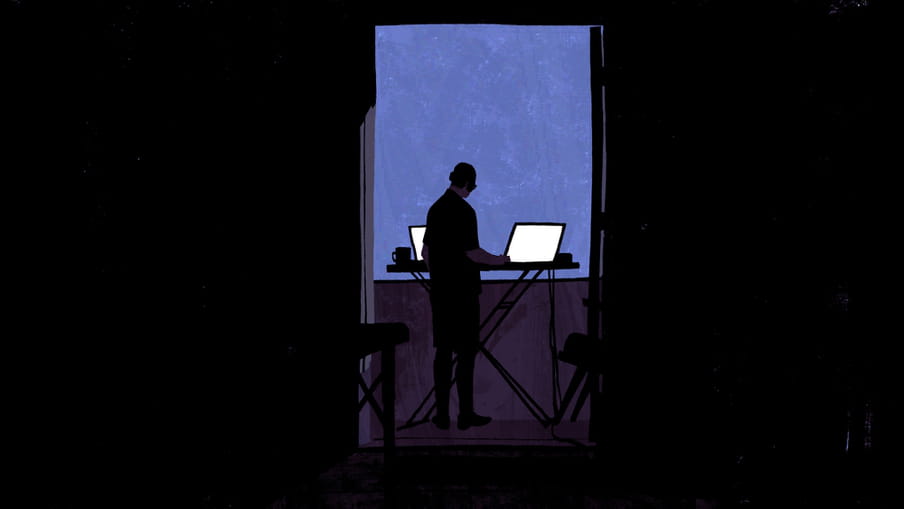

On Tuesday morning, I get up at seven. In the corridor, I run into a cheerful Morozov. No, The Syllabus will not be launched for the time being, he says, due to "a few minor technical issues." This afternoon, maybe. Probably. "Around 1pm," he thinks.
Then, he presses a stack of A4 paper into my hands. "These are amazing," he says. I’m holding printouts of the curated newsletters that The Syllabus offers. One, titled "The Intellectual", is about "art and ideas". "The Machinist" is for people interested in technology, "The Progressive" contains content about "political economy", ‘The Activist’ is about "social justice" and "The Cosmopolitan" looks at "international studies". There are also four "best of" newsletters: the best videos, podcasts, journalism and scientific articles.
I browse through the printed sheets and see titles of books that I immediately want to read, podcasts that I would never have found myself, videos that I will watch on my way back to the Netherlands.
Morozov nods, satisfied. For him, this is what it’s all about. The information is there, the syllabi are filled.
The fact that the design of The Syllabus isn’t working yet, the newsletters are still PDFs that he needs to print out, the launch is postponed – none of this really matters.
"The system works," says Morozov.
Downstairs, I have an espresso and say goodbye to the team.
We walk outside. Antonio is ready. Morozov escorts me to the car. "I don’t know about the launch," he says, "but the lunch will be great."

The Syllabus was finally launched the next day.
This piece first appeared on De Correspondent. It was translated from the Dutch by John Edwards.
Dig deeper
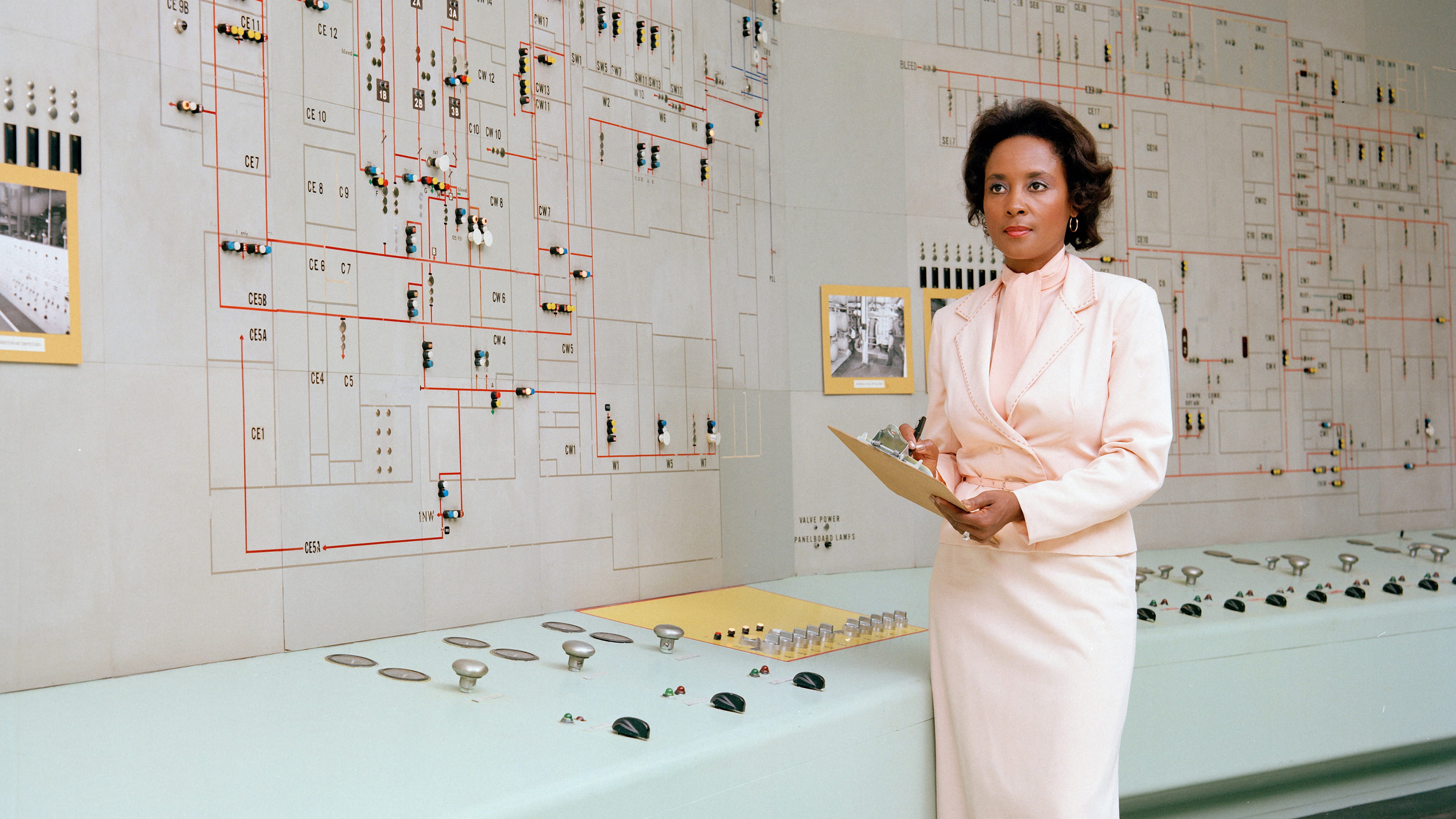 Algorithms that run our lives are racist and sexist. Meet the women trying to fix them
From insurance payments to courtroom sentencing, AI makes increasingly complex decisions about our lives. And our belief that data is neutral allows algorithms to get away with murder. The fight back is being led by those most likely to find themselves on the wrong side of a computer’s decision.
Algorithms that run our lives are racist and sexist. Meet the women trying to fix them
From insurance payments to courtroom sentencing, AI makes increasingly complex decisions about our lives. And our belief that data is neutral allows algorithms to get away with murder. The fight back is being led by those most likely to find themselves on the wrong side of a computer’s decision.

